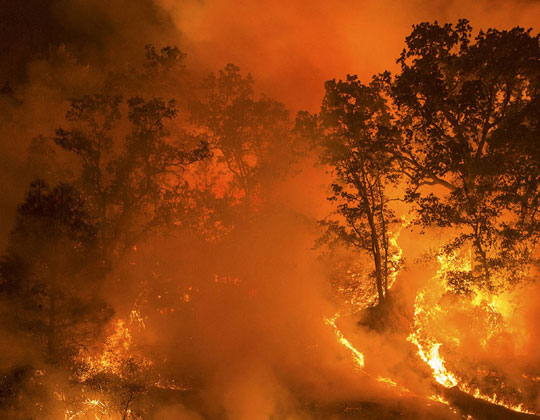While California Burns, So Does The Feud Between Trump And Biden

courtesy of Tyson Fisher. Over 3 million acres have burned in California alone, setting a record for the state.
The destructive wildfires on the West Coast have intervened in the race between President Trump and Joe Biden, emerging as another urgent issue amidst an alarming pandemic. According to the California Department of Forestry and Fire Protection, more than 3.3 million acres of land have burned in California alone this year, more severe than the fires in 2019. The wildfires also claimed the lives of around twenty-six people, and officials remain concerned that the weather conditions will worsen the crisis. With more than a dozen major fires in California burning, especially during the election season, it was not long before it became a campaign issue between the two candidates.
On September 14, the President landed in a smoky skied California, where he was joined by local and federal emergency officials for a briefing on the crisis. He has previously been criticized for his lack of response towards the fires, which have created concerning orange-colored skies throughout the West Coast. Trump has a history of picking on California and calling out Governor Gavin Newsom, to scrutinize what he views as the state’s “poor forest management”. According to The New York Times, at a Pennsylvania rally in August, he said, “you’ve got to clean your floors, you got to clean your forests”. Behind the scenes however, President Trump has stationed more than 26,000 federal personnel out west to fight the fires, according to White House spokesman Judd Deere, and has signed thirty-seven federal grants to support those on the front lines. In California, Trump challenged climate change and blamed the fires on poor management, although most of the forests in California are federally managed. In a briefing press conference, California National Resources SecretaryWade Crowfoot disagreed with the President’s comments and cautioned, “If we ignore that science, and sort of put our head in the sand, and think it’s all about vegetation management, we’re not going to succeed together protecting Californians”. In response to the Secretary, Trump said, “it (the climate) will start getting cooler”. Crowfoot responded, “I wish science agreed with you”. “I don’t think science knows,” the President replied.
Joe Biden, on the other hand, is using the fires to highlight Trump’s refusal to accept the reality of human-caused climate change. In a press conference in Delaware on September 14, the Democratic nominee blasted the President calling him a “climate arsonist,” and “climate denier,” for ignoring science and relating it to the wildfires out west and natural disasters around the country. Addressing Trump’s visit to California, Biden replied that the President has “no interest” in facing the challenge of climate change, saying it is “another crisis he won’t take responsibility for,” which was seen as an attack on the administration’s response to the Coronavirus pandemic. In his speech, Biden said that Trump has “already said he wanted to withhold aid to California, to punish the people of California because they didn’t vote for him”. The Democratic nominee was referring to the recent allegations made by Miles Taylor, a former official at the Department of Homeland security, that the President withheld funds towards the people who lost property in the fires because “he was so rageful that people in the state of California didn’t support him,” according to the Los Angeles Times.
Biden has a long history of working towards climate change, dating back to introducing the “Global Climate Protection Act of 1987,” the first climate change bill to reach the Senate. Signed by President Reagan, it directed the government to research a plan to deal with global warming. Biden’s campaign website emphasizes his plan for dealing with climate change, stressing on the fact that it not just threatens the environment but also “our health, our communities, our national security, and our economic well-being”. On the other hand, President Trump’s controversial remarks on climate change have put him at a disadvantage in this battle between the rivals. After taking office, he announced that the U.S. would depart from the Paris Climate Agreement, which commits 187 countries to fight rising temperatures. At the time, Trump said he wanted to settle for a “fair” deal that would not affect the economy. During his campaign in 2016, he said climate change was “a hoax”, but has gone back on that statement saying in a recent interview: “I don’t think it’s a hoax, I think there’s probably a difference”.
According to MSN News, when voters were asked if climate change was a factor in the severity of the fires, ninety percent of Democrats said it was a major factor compared to nineteen percent of Republicans. About seventy percent of voters without a party preference said climate change was a major factor. Of the voters who were surveyed, forty-six percent of Republicans and sixty-one of voters who identified as “very conservative” said climate change was not a factor in recent fires. Only two percent of Democrats, one percent of people who are “very liberal” and nine percent of people without a political affiliation said climate change was not a factor. Looking at these statistics, it is no doubt that the contrasting views between the two candidates will create a divide amongst voters on who to appoint as the forty-sixth president.





